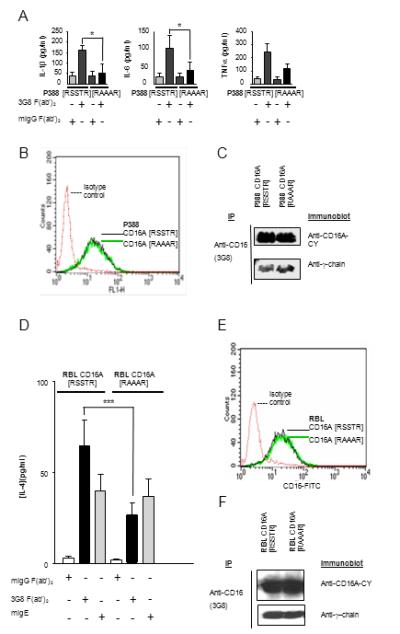FIGURE 2.

Receptor-mediated production of pro-inflammatory cytokines is impaired in transfectants expressing non-phosphorylatable CD16A. (A) P388D1 stable transfectants expressing CD16A [RSSTR] or [RAAAR] were stimulated in a receptor specific manner as described previously (13) . Cytokine proteins in supernatants were measured by ELISA. Data are the mean ±SD from six experiments. *p < 0.5 by Student paired t-test. (B) Expression of human CD16A [RSSTR] and [RAAAR] on the surface of P388D1 stable transfectants measured by FITC-3G8 staining. (C) Association of γ-chain with CD16A [RSSTR] and [RAAAR] in P388D1 stable transfectants by co-immunoprecipitation. CD16A was immunoprecipitated from cell lysates with mAb 3G8 and immunoblotted sequentially with polyclonal anti-CD16A-CY and polyclonal anti-γ-chain. (D) RBL-2H3 stable transfectants expressing CD16A [RSSTR] or [RAAAR] were stimulated in a receptor specific manner as described previously (13) . IL-4 protein in supernatants was measured by ELISA. Data are the mean ±SD from six experiments. ***p < 0.001 by Student paired t-test. (E) Expression of human CD16A [RSSTR] and [RAAAR] on the surface of RBL-2H3 stable transfectants measured by FITC-3G8 staining. (F) Association of γ-chain with CD16A [RSSTR] and [RAAAR] in RBL-2H3 stable transfectants by co-immunoprecipitation. CD16A was immunoprecipitated from cell lysates with mAb 3G8 and immunoblotted sequentially with polyclonal anti-CD16A-CY and polyclonal anti-γ-chain.
